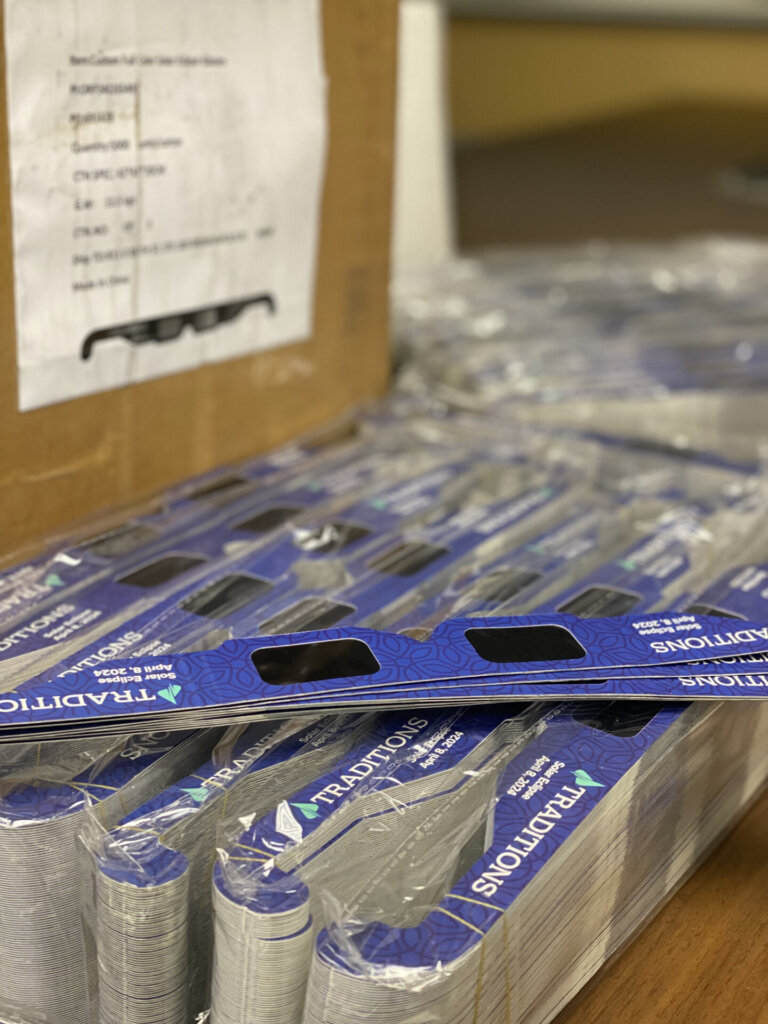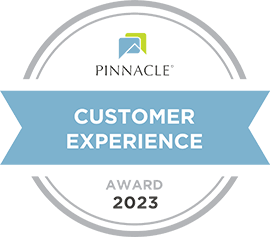How to Safely Enjoy the Upcoming Solar Eclipse

Guest blogger: Bryan Simpson, President, Cincinnati Astronomical Society
On April 8, 2024, eyes will turn to the sky for an exciting celestial event: a total solar eclipse! In 2017, Americans last experienced a total solar eclipse, something not seen in our country in 38 years. Millions of Americans experienced one of the greatest displays in all of nature as it was celebrated from coast to coast. It is estimated that a staggering 88% of all Americans viewed the total solar eclipse, either in person or via some media, with discussion regularly occurring weeks before and after the event. Now, a mere 7 years later, we will have an opportunity to witness this spectacle again, this time even better than the last, with totality lasting longer and coming closer to our area. What's even more exciting is several of our Traditions communities are in the path of totality, while most of our communities will be able to enjoy partial eclipse!
Safety Tips to Enjoy the Eclipse
Celestial and astronomical events like eclipses are very exciting, but it is very important to know how to experience them safely. There is nothing inherent about an eclipse that makes the sun more dangerous to look at than any other day. It’s just that we typically have no reason to look directly at the sun for an extended period of time. The darkening of the sun sometimes leads to a false sense of security when attempting to observe it.
What makes this so dangerous is that your eyes have no pain receptors inside, so you can’t feel the damage being done while observing unprotected. It can take 24 hours to notice a problem and up to a year to determine if the damage is permanent. Therefore, it is important to make sure that you have protection while viewing the eclipse.
Two Safe Eclipse Viewing Methods
Protection Method
There are two general methods to safely observe the sun during an eclipse: protection and projection.
The most common way to protect your eyes during direct observation is using certified quality eclipse glasses. These glasses block most of the energy emanating from the sun and will allow observation through the duration of the partial eclipse without damaging your eyes.
Unfortunately, there will be sellers and resellers trying to capitalize on this rare event and will sell glasses that might not have the proper level of protection. One way to check is to look for the ISO number. It should say ISO 12312-2 (sometimes written as ISO 12312-2:2015). If you are a resident of a Traditions community, your team has glasses ready for you!
If you need more glasses, you can obtain them directly from the Cincinnati Astronomical Society for your family to be able to safely view the eclipse. Check Cincinnati Astronomical Society’s social media channels in the weeks leading up to those dates for instructions on how to get some. You can also check out the CAS website for information on obtaining certified safe solar glasses.
Do not use regular, sunglasses or an unfiltered telescope to view the eclipse! Download our eclipse guide here for more details on protection during the eclipse.
Projection Method
Another very common and easily practiced way of viewing an eclipse is using a method called projection. It allows for indirect viewing of the eclipse through the duration with no danger to your eyesight.
The simplest way to project an image of the eclipse is to just poke a small hole in a piece of paper, and let the light from the sun shine through onto another object during the eclipse. The crescent of the sun will be visible as a small point of light on the surface which you choose to project. It’s the same basic concept as a camera obscura, which projects an image onto a surface using a hole as the aperture.
Another method of projection involves using a small telescope or a pair of binoculars.
SAFETY TIP: Set the tripod low to prevent people from being tempted to look through the eyepiece. This technique doesn't use any safety filters on the telescope or binoculars so looking into the eyepiece would be very dangerous. Download our eclipse guide here for more details on how to use projection to safely view the eclipse.
Totality is Totally Worth It
The totality experience allows the viewer to see the magnificent outer atmosphere of the sun, also known as the corona, as well as stars or planets in the middle of the day. On April 8, 2024, the eclipsed sun will be flanked by Venus to the West and Jupiter to the East.
Also visible are prominences emanating from the sun’s surface. They will appear as pinkish fringes on the outer edge of the eclipse.
Other features possibly witnessed during totality are shadow bands on the ground as the moon’s shadow rolls across the surface of the Earth. Another phenomenon known as Bailey’s Beads will be visible. These are small areas of light from the sun that peek out from behind the edge of the moon where mountains and valleys on the surface of the moon create an irregularly shaped edge. If you are so inclined to travel a short distance, there is a much greater experience to be gained by being within the path of totality.
Fortunately, many Traditions communities are in the path of totality! That means you’ll be able to enjoy the best experience and most exciting phase of the solar eclipse. Is YOUR community in the path of totality? Click here to find viewing times for each Traditions community.








